#dog health Information
Explore tagged Tumblr posts
Text
A Tail-Wagging Guide: Unleashing the Power of Dog Health eBook & Dog Owner's Delight eBook
As a new dog owner, I was overwhelmed with information on caring for my furry friend. Sifting through conflicting advice online left me confused. That's when I discovered the Dog Health eBook and Dog Owner's Delight eBook bundle, and it's been a game-changer for my relationship with my dog.

Empowering Knowledge for a Healthy Pup
The Dog Health eBook is a comprehensive guide that dives deep into all aspects of canine health. From understanding basic nutrition to recognizing the signs of illness, this eBook provides a wealth of information in an easy-to-understand format. The clear explanations and helpful illustrations empowered me to make informed decisions about my dog's diet, exercise routine, and overall well-being.
Beyond the Physical: Training and Behavioral Insights
The Dog Owner's Delight eBook complements the health focus perfectly. This guide delves into the fascinating world of dog psychology and training techniques. It explores the importance of positive reinforcement and offers practical tips for tackling common behavioural issues like barking, chewing, and leash pulling. Thanks to this eBook, I've been able to build a stronger bond with my dog based on mutual respect and understanding.
A Tailored Approach to Different Dog Breeds
Both eBooks go a step further by acknowledging the unique needs of different dog breeds. They offer valuable insights on breed-specific health concerns and training approaches. This personalized approach ensured that the information I learned was relevant to my dog's specific needs and characteristics.
A Valuable Resource for All Dog Owners
Whether you're a seasoned dog owner or a new puppy parent like myself, this eBook bundle offers something valuable. The combination of health and training knowledge provides a well-rounded understanding of canine care. The clear writing style makes the information accessible to everyone, regardless of prior experience.
An Investment in a Happy and Healthy Dog
While the eBooks themselves are a digital product, the knowledge gained is an investment that pays off in a big way. By understanding my dog's health needs and learning effective training techniques, I'm able to provide a happier and healthier life for my furry companion. The wagging tail and those puppy dog eyes say it all!
Overall, the Dog Health eBook and Dog Owner's Delight eBook bundle is an invaluable resource for any dog owner. It empowers you with the knowledge and tools to create a strong bond with your dog and ensure their overall well-being.
#Dog care ebooks#Dog health information#Dog training guide#Digital dog resources#New dog owner guide#Health:#Canine nutrition guide#Dog illness symptoms#Dog health for all breeds#Breed-specific health concerns#Promoting dog well-being#Positive dog training methods#Common dog behavior issues#Building a strong dog bond#Dog psychology for owners#Effective dog training techniques#pen_spark#Informed pet care decisions#Healthier and happier dog#Stronger owner-dog relationship#Clear and accessible writing#Valuable resource for all dog owners#Dog Health eBook#Dog Owner's Delight eBook#Digital download products#Ebooks for dog lovers#Investment in your dog's health#dog#dogday#dog news
0 notes
Text



he's thriving
#cat chilling in the dog house#he found the two most easily riled up guys to direct all his insufferable know-it-all energy towards#I can just picture his mental health bar go up each time he gets a reaction#big brother stuff#being a condescending jerk and then nonchalantly being super mega nice and generous as if it's nothing at all#here idiot. take this helpful secret information that I didn't have any obligation to give you. whatever. fuck off#in the slutty tanktop too#and the feather coat#tattoos out#gloves gone. what was up with those??#trafalgar law live reaction#one piece
80 notes
·
View notes
Note
I regret to inform you that the cargo pants cav guy does exist and was in the last dog training class I took
omg please give me details I have to hear this
#this is so funny like. this is the breed everyone recommends when theyre trying to be mean and say someone cant handle x breed#they were literally created to sit on your lap and love you#glad that cargo pants cav guy is only a concept to me and i have never met him irl#usually its just cargo pants guy from another breed talking about how boring my dog is#or that other type of guy that is like “your dog is cute but i am shaking my head to show I am aware cavs have health issues”#“and also im going to inform you of this. do you know cavs have health issues? i bet you are not aware of that given that you own one”#but like if anyone ever said cavs were Too Much Dog like as a breed I think id laugh at them. like what#ckcs
10 notes
·
View notes
Text
I tried to go slow this week and be kind with myself and didn't push myself to do things I didn't feel like doing. I feel better compared to one week ago and to the whole of July, where there were moments I thought I wouldn't make it to the next day. I am still confused and in need of stability in all areas but someday I will have it
#Tweety.txt#trying to be positive amidst the storm#aside from what happened to me last week... july-august have the power of making me feel the loneliest loser on the planet and I hate it#we had peaks of 41°C/105°F this week and I was losing my mind. the warmth impacts mental/physical stability so much#also. my dog's health conditions b/c her passing influenced my mood bc she hadn't been ok since june and I was so worried#anyway too much information I'm sorry I talk to much#now I have to do the daunting task of washing my hair with 38°C outside
7 notes
·
View notes
Text
i am so glad this week is finally (almost) over
i had an appointment with my pcp on monday to see about this possible kidney stone situation
they did a urinalysis on me and sure enough i do have some blood in my urine so that plus the pain means it's likely there's a stone, but i'm in a situation again where i haven't had any pain for days so it's like...that's not good !! (especially since this has been going on for a few months at this point !)
they ordered me a ct scan which i had today so i'm hoping maybe sometime tomorrow i'll get the results of that and we can maybe figure out what's going on
i also had a dentist appointment on wednesday but it was just a cleaning and my dentist said everything looks good. it is kinda funny because i was actually supposed to have this appointment months ago but decided to reschedule because i had too much going on that week and so it got pushed out until now and then i end up having even more shit to do this week than i did back then so...oh well !! it's finally done
and tomorrow i've gotta do some of my usual errands (mostly taking the garbage off and getting a few things from the grocery store) and then i think i'll finally be done !! hopefully !!
hope you have a good, restful weekend coming up if you're reading this !! <3
#i'm just hoping and praying at this point that i've passed the stone if that is what it is#and that i don't get a call about this ct and it's like#uh hey you're gonna need a procedure to get this thing out before you start to go septic again#just....please god not again#but i guess if that is the situation then we'll just deal with it#anyway#in any case i at least got all my work done for the week so that's something#i've had to work later to make up for all the time i've been out at these appointments but i did it !!#and now hopefully this weekend i can just......rest#please god#i do have a lot of stuff i need to look over for school because i have a meeting with my student advisor next week#and although i appreciate him sending me all this information it's.....a lot#and i'm kind of starting to panic now like 'uh-oh!! uh-oh what have i gotten myself into ?!'#but i'm gonna just...power through it and keep going#because i really want this now and it's probably gonna add a bunch of stress to my life#when i already don't really have a lot of room for that but#i think in the end it'll be worth it#so that's what we're holding out for#and in the mean time if my body could just.....not have any more health problems#that would be fucking amazing thank you#anyhow#i didn't get a lot of sleep last night so i'm gonna go to bed now#it's just gonna be me here this weekend because mom's off with her boyfriend#which is fine i like having the place to myself#but i also have to take care of our dog by myself and he's way more attached to her than me#so he tends to be super anxious when she's not here#and so we're gonna do our best with that as well#but part of that also means i gotta get up ass early to let him out to go potty#so i'm gonna go get a few hours in before it's time for that#and then once i run my errands tomorrow i can maybe hopefully finally unwind a little
5 notes
·
View notes
Text
dogs are more psychologically and emotionally similar to humans than any other animal. in this sense it is an error to overemphasize breed when it comes to personality, because dogs are individuals primarily shaped by environment. yes, certain instincts are in-built for a generality of a breed (by far the most consistent and prevalent example being herding), but an individual dog will have unique fears, habits, likes and dislikes, quirks, temperament, physicality. this is missing from most discussions on the topic but it is well-understood by animal behaviorists. there is no particular behavior that all members of a breed display, and there is no monolithic personality that automatically applies to all members of a breed, full stop.
#source: i worked intensively with world-renowned animal behaviorists and dog trainers my entire childhood and adolescence#and i've had many discussions with them on the subject#i also worked at an animal hospital for two years#if you think news articles and google searches better inform you you're a clown#the most important factor in considering breed is common health risks
5 notes
·
View notes
Text
sometimes being an adult is also soft-core parenting your peers into not dying from an impacted molar because they did not know you could just "go to a dentist" or that you could get dental insurance independently, as opposed to workplace dental. my sister's boyfriend has a whole flock of 20 something guy friends who have somehow made it this long with very little information about how the world works. the boyfriend is coming home telling my sister stuff like "wow. sucks that Kyle's tooth is still killing him. nothing you can do tho" and then my sister just sits there a moment and i can see her thinking "do i let this go, or do i do something?" and she inevitably caves and goes "okay so when you say his tooth is killing him, do you mean literally?" honestly i think schools should focus more on "how insurance works and how to get it" and "this is how to figure out what kind of state/federal support is available and who is eligible for it, and how to apply" and "yes anyone can go to a food pantry you don't have to be a certain level of poor or provide proof" and then "these are signs that you should go to the doctor/dentist ASAP" and "here are some basic lessons on how to clean/maintain your house/apartment." throw in some info on basic hygiene and actual decent sex ed just for fun. because i swear to god, there are a LOT of people who do NOT know these things, and i'm pretty sure it is legit killing some of them.
#education#information#he ended up having a seriously impacted wisdom tooth and was in a lot of pain for a LONG time#like at least months. and he just...did not know that he could do anything about it#if you leave something like that untreated long enough you could actually die#you could develop a serious infection in your gums and jaw that can lead to death#please get dental insurance. and if u have on that kinda sucks that comes w/your state plan or so on#there are some dental offices that offer 'membership plans' or similar things#that are not technically insurance so they don't conflict w/ur state stuff#but they are for all intents and purposes dental insurance#if possible please get dental insurance. everyone gets tooth problems and they suck in untreated#and can lead to serious health complications#my sister is the expert on hooking ppl up w/support shit#probably because we're on a bunch#and bc my nephew is very medically complex so we're coordinating several programs at once for him#for real he qualifies for tons of shit due to So Many Problems#and my sister is very proactive about We Will Just Take All Benefits Thank You#she pays it back by pushing other ppl to apply for things they definitely qualify#usually. again. the boyfriend's buddies. who are all just like barely scraping by#my sister just aghast that they're just raw-dogging life. like my guy u absolutely qualify for some aide#please. here is a list of things to apply for and the websites to find them/numbers to call#for real everyone just go google 'state benefits [your state]' right now#a lot of ppl qualify for SNAP or WIC and other stuff and just don't know it
1 note
·
View note
Text
If you think there is even the slightest possibility you or someone you know has been exposed to rabies GO TO THE HOSPITAL IMMEDIATELY. There are only a handful of people who have become symptomatic and lived in all of human history.
You will not be one of them.
The only way is to get treatment before you develop symptoms.
SHIT.
Please reblog!
44K notes
·
View notes
Text
Cane Corso Dog Breed Complete Information
Cane Corso Dog
Cane Corso, a large Italian Mastiff closely related to the Neapolitan Mastiff is a working dog with loyalty, protectiveness, independence, and guarding instincts. Due to their guarding nature, they were originally bred to guard farms and livestock. These powerful and athletic dogs develop strong bonds with families but are reserved toward strangers. Furthermore, the Cane Corso would be a well-mannered companion dog if an experienced owner handled and trained them at a young age.
Unfortunately, some people have misconceptions about their temperament because of their sturdy and muscular stature and past connection with fighting dogs. Otherwise, these dogs are affectionate and peace-loving. Therefore, they observe their surroundings quietly.
The term Cane Corso reflects its historical role in guarding. The word “Cani” derives from Latin, meaning “dog,” while “Corso” is Italian for “sturdy” and “athletic.” This breed is excellent for those who want a giant, sturdy, and willful dog in their homes but experience handling is the key point before purchasing or adopting a Cane Corso. This is not a good choice for everyone.
Personality of Cane Corso
At first glance, the cane corso appears imposing and intimidating due to its large, muscular, and athletic physique. Cane Corsos are intelligent and confident dogs you can trust to protect your family and home, but early training and socialization are equally important; otherwise, they become your boss.
read more:
https://breedbarks.com/cane-corso-dog-breed/
#cane corso dog#cane corso history#cane corso training#cane corso information#cane corso health issues
1 note
·
View note
Text
What's the Endocannabinoid System?
Consider the phrase “endocannabinoid.” The phrase “cannabinoid” is derived from the word “cannabis,” and “endo” refers to the fact that it is formed naturally within the body. As a result, “endocannabinoid” actually refers to cannabis-like compounds that exist naturally in our dogs (and our) bodies. Our dogs, us, our cats, and other mammals all have the same endocannabinoid system. The ECS itself…

View On WordPress
#Canine Anxiety#Canine Cbd Oil#Canine Hemp Oil#Cannabinoids#cbd for dogs#Cbd For Dogs Anxiety#cbd oil for dogs#Dog Behavior#Dog Information#dog lovers#dog nutrition#Dog Training#dogs#ecs#Endocannabinoid#Endocannabinoid Deficiency#endocannabinoid system#hemp for dogs#hemp oil for dogs#holistic#Holistic Health#Holistic Living#Holistic Medicine#Learning About Dogs#Marijuana For Dogs#Natural#natural remedies for dogs#research#Separation Anxiety#Separation Anxiety For Dogs
1 note
·
View note
Text

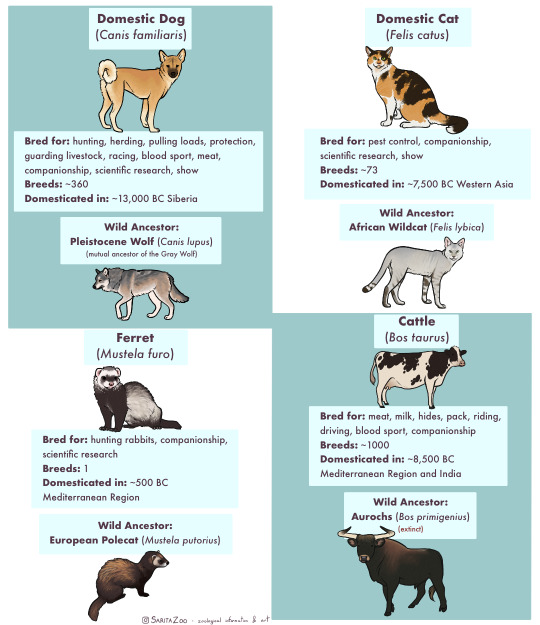


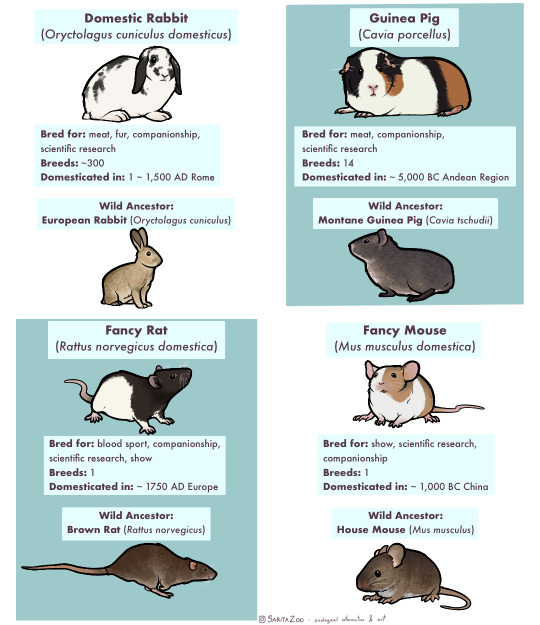
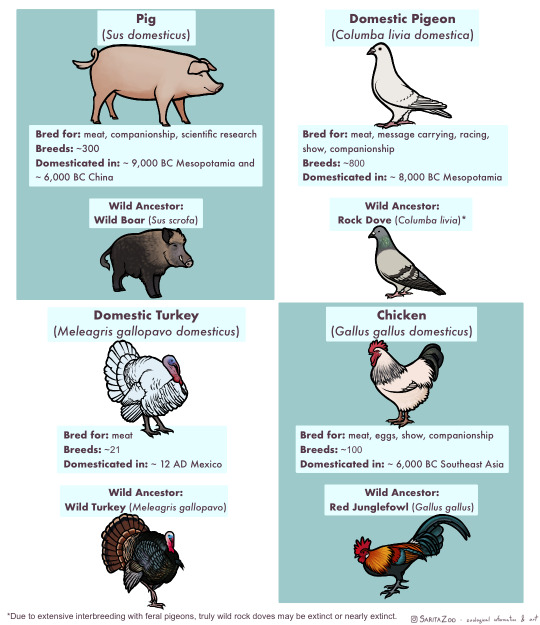
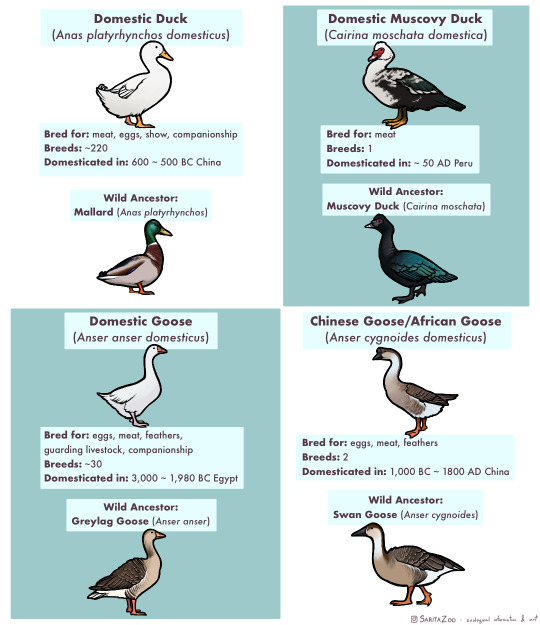
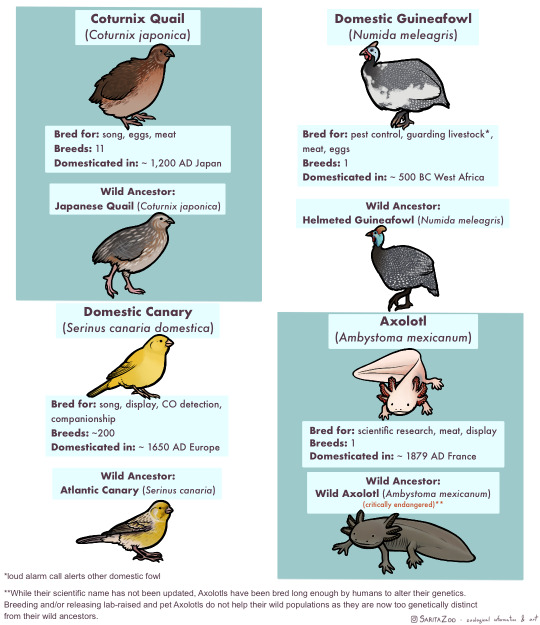
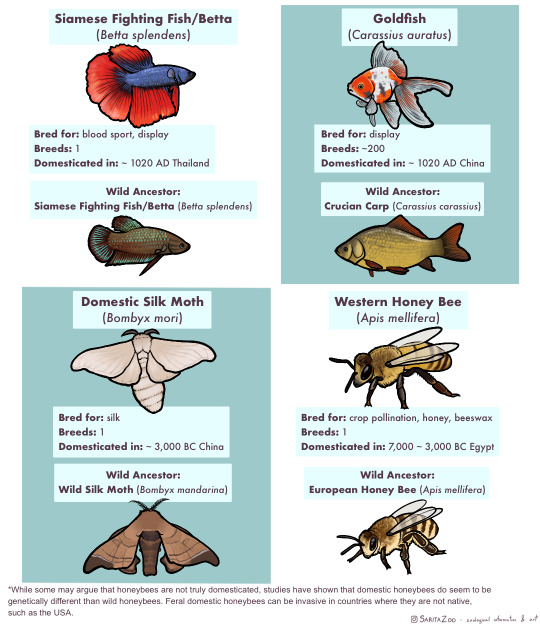

Phew. This one took, uh… a bit longer than expected due to other projects both irl and art-wise, but it’s finally here. The long-awaited domestic animal infographic! Unfortunately, I didn’t have enough space to cover every single domestic animal (I’m so sorry, reindeer and koi, my beloveds) but I tried to include as many of the “major ones” as possible.
I made this chart in response to a lot of the misunderstandings I hear concerning domestic animals, so I hope it’s helpful!
Further information I didn’t have any room to add or expand on:
🐈 “Breed” and “species” are not synonyms! Breeds are specific to domesticated animals. A Bengal Tiger is a species of tiger. A Siamese is a breed of domestic cat.
🐀 Different colors are also not what makes a breed. A breed is determined by having genetics that are unique to that breed. So a “bluenose pitbull” is not a different breed from a “rednose pitbull”, but an American Pitbull Terrier is a different breed from an American Bully! Animals that have been domesticated for longer tend to have more seperate breeds as these differing genetics have had time to develop.
🐕 It takes hundreds of generations for an animal to become domesticated. While the “domesticated fox experiment” had interesting results, there were not enough generations involved for the foxes to become truly domesticated and their differences from wild foxes were more due to epigenetics (heritable traits that do not change the DNA sequence but rather activate or deactivate parts of it; owed to the specific circumstances of its parents’ behavior and environment.)
🐎 Wild animals that are raised in human care are not domesticated, but they can be considered “tamed.” This means that they still have all their wild instincts, but are less inclined to attack or be frightened of humans. A wild animal that lives in the wild but near human settlements and is less afraid of humans is considered “habituated.” Tamed and habituated animals are not any less dangerous than wild animals, and should still be treated with the same respect. Foxes, otters, raccoons, servals, caracals, bush babies, opossums, owls, monkeys, alligators, and other wild animals can be tamed or habituated, but they have not undergone hundreds of generations of domestication, so they are not domesticated animals.
🐄 Also, as seen above, these animals have all been domesticated for a reason, be it food, transport, pest control, or otherwise, at a time when less practical options existed. There is no benefit to domesticating other species in the modern day, so if you’ve got a hankering for keeping a wild animal as a pet, instead try to find the domestic equivalent of that wild animal! There are several dog breeds that look and behave like wolves or foxes, pigeons and chickens can make great pet birds and have hundreds of colorful fancy breeds, rats can be just as intelligent and social as a small monkey (and less expensive and dangerous to boot,) and ferrets are pretty darn close to minks and otters! There’s no need to keep a wolf in a house when our ancestors have already spent 20,000+ years to make them house-compatible.
🐖 This was stated in the infographic, but I feel like I must again reiterate that domestic animals do not belong in the wild, and often become invasive when feral. Their genetics have been specifically altered in such a way that they depend on humans for optimal health. We are their habitat. This is why you only really see feral pigeons in cities, and feral cats around settlements. They are specifically adapted to live with humans, so they stay even when unwanted. However, this does not mean they should live in a way that doesn’t put their health and comfort as a top priority! If we are their world, it is our duty to make it as good as possible. Please research any pet you get before bringing them home!
#SaritaZoo#my art#domestic animals#domestication#pets#dogs#cats#ferrets#cows#sheep#goats#bovids#horses#donkeys#camels#llamas#alpacas#rabbits#guinea pigs#rats#pet rats#pet mice#pigs#pigeons#turkeys#chickens#ducks#geese#quail#i ran out of tags rip
33K notes
·
View notes
Text
Treatment Options for Bacterial Pneumonia in Dogs and Cats
Bacterial pneumonia in dogs and cats is a serious respiratory condition that affects both dogs and cats. It can lead to severe health issues if not treated promptly. At Tri-County Animal Hospital, we prioritize your pet’s health and well-being, offering comprehensive treatment options for bacterial pneumonia in pets. Understanding the treatment options available can help pet owners make informed decisions and ensure their furry friends receive the best care possible.

Understanding Bacterial Pneumonia in Pets
Bacterial pneumonia is an infection of the lungs caused by bacteria, leading to inflammation and difficulty breathing. Common bacteria that cause pneumonia in pets include Bordetella bronchiseptica, Streptococcus, and Staphylococcus species. Pets with bacterial pneumonia often show symptoms such as coughing, difficulty breathing, lethargy, fever, and loss of appetite. If you notice any of these signs, it is crucial to seek veterinary attention immediately.
Diagnostic Process
Before starting treatment, a thorough diagnosis is essential. At Tri-County Animal Hospital, our veterinarians perform a series of diagnostic tests to confirm bacterial pneumonia and identify the causative bacteria. These tests may include:
Physical Examination: Listening to the lungs for abnormal sounds like crackles or wheezes.
Chest X-rays: To visualize the lungs and identify areas of infection and inflammation.
Blood Tests: To assess the overall health of the pet and identify any underlying conditions.
Tracheal Wash or Bronchoalveolar Lavage: Collecting samples from the lower airways to identify the specific bacteria causing the infection.
Treatment Options for Pet’s Bacterial Pneumonia
Once bacterial pneumonia in pets is diagnosed, prompt and effective treatment is necessary to ensure a full recovery. The treatment plan typically includes the following:
Antibiotic Therapy
The cornerstone of treating bacterial pneumonia in dogs and cats is antibiotic therapy. The choice of antibiotics depends on the type of bacteria identified and their sensitivity to specific drugs. Commonly used antibiotics include amoxicillin, doxycycline, and enrofloxacin. The treatment duration usually ranges from two to six weeks, depending on the severity of the infection and the pet's response to the medication. It is crucial to follow the veterinarian’s prescription and complete the entire course of antibiotics, even if the pet’s symptoms improve before the medication is finished.
Supportive Care
Supportive care is essential to help pets recover from bacterial pneumonia. This may include:
Hydration: Ensuring the pet remains well-hydrated to thin mucus and support lung function. In severe cases, intravenous fluids may be necessary.
Nutritional Support: Providing a high-quality, nutritious diet to support the immune system and overall health.
Oxygen Therapy: For pets with severe breathing difficulties, oxygen therapy may be administered to improve oxygen levels in the blood.
Nebulization and Coupage
Nebulization involves the administration of aerosolized medications to the lungs, helping to loosen mucus and improve breathing. Coupage, a technique that involves gently tapping the chest, can help loosen and clear mucus from the lungs. At Tri-County Animal Hospital, we demonstrate these techniques to pet owners for at-home care.
Anti-inflammatory Medications
In some cases, anti-inflammatory medications may be prescribed to reduce lung inflammation and alleviate symptoms. These medications should only be used under the guidance of a veterinarian, as improper use can have adverse effects.
Rest and Recovery
Ensuring that pets get plenty of rest is crucial for their recovery. Limiting physical activity and providing a calm, stress-free environment can help pets heal faster. It’s important to monitor your pet closely and follow any specific care instructions provided by the veterinarian.
Follow-up Care
Regular follow-up visits to Tri-County Animal Hospital are essential to monitor the pet’s progress and adjust the treatment plan as needed. Follow-up chest X-rays and physical examinations help ensure that the infection is resolving and that there are no complications. In some cases, additional diagnostic tests may be required to confirm the pet's recovery.
Preventing Bacterial Pneumonia in Pets
Prevention is always better than cure. Here are some tips to reduce the risk of bacterial pneumonia in pets:
Vaccination: Ensure your pets are up-to-date on their vaccinations, especially those protecting against respiratory infections.
Good Hygiene: Maintain a clean living environment for your pets, and avoid exposing them to other animals with respiratory infections.
Regular Veterinary Check-ups: Routine health check-ups at Tri-County Animal Hospital can help detect and manage underlying health issues that may predispose pets to pneumonia.
Healthy Diet: Provide a balanced diet to support your pet's immune system and overall health.
Conclusion
Bacterial pneumonia in dogs and cats is a serious condition that requires prompt and effective treatment. At Tri-County Animal Hospital, we are dedicated to providing comprehensive care to help your pets recover and thrive. By understanding the treatment options and following the veterinarian's guidance, pet owners can ensure their furry friends receive the best possible care and make a full recovery. If you suspect your pet has bacterial pneumonia, don’t hesitate to contact us for an evaluation and personalized treatment plan.
#Bacterial Pneumonia in Pets#Bacterial Pneumonia in Dogs#Bacterial Pneumonia in Cats#Dog and Cat Respiratory Health#Tri-County Animal Hospital#Pet Pneumonia Treatment#Comprehensive Pet Care#Veterinary Pneumonia Treatment#Respiratory Conditions in Dogs and Cats#Pet Health Information#Treating Pneumonia in Pets
0 notes
Text
I agree 100% but for a very different reason (not that I necessarily disagree with your reasoning, just that my reason for agreeing is different than the one you give), dogs that aren't service dogs often put service dogs (and either directly or indirectly, their owner/handler) at risk. If a non-service dog (which includes emotional support dogs, your dog isn't special because you fell for a scam) decides to jump at, bark at, or try to distract a service dog, it can literally cause a serious health episode if not death, if the dog isn't paying attention to alert their handler of an upcoming health event.
That's not even mentioning if the non-service dog attacks a service dog, it's not uncommon to have to retire that service dog. Meaning that now, while that service dog may still be able to alert and help at home, it can't often be taken out and about because any run in with another dog, will or can cause it to be unable to focus on it's job as a service dog.
So now this disabled person is once again house-bound, they have to spend the YEAR/S to train their service dog to their specific needs, the hundreds to THOUSANDS of dollars to get a service dog, all while being stuck at home, or risking their heath by going without a proper service dog.
Unless a dog is an actual service dog, for the health and safety of everyone, and ESPECIALLY disabled people, keep your dog inside or in specific spaces meant for dogs.
Also people with allergies to dogs exist, they should be able to exist in public without having to deal with allergies all because you couldn't handle leaving Fido alone for a few hours.
Don't get me wrong, I love dogs, I have a dog myself, but my love for dogs doesn't supersede my love & compassion for other people who are just trying to go about their day.
I hate hate hate hate how dog friendly everything is in the city now. Barring medical necessity, there is no reason to bring your dog to a restaurant, there is no reason to bring your dog to the grocery store, there is no reason to bring your dog to the nail salon. Dogs do not need to go everywhere you go why am I being forced to be around dogs all the time
#service dog#dogs#dog lover#service dogs#disability#disabled#disability rights#disabled rights#disablility#disabilties#emotional support dogs#emotional support dog#emotional#health#safety#health and safety#information#psa#dog psa
28K notes
·
View notes
Text
Adorable Australian Labradoodle Puppies: Find Your Perfect Pet
Discover the charm of Australian Labradoodle puppies at Sunrise Australian Labradoodles. Our puppies are lovingly bred for temperament, health, and beauty. Perfect for families and individuals alike, these intelligent, hypoallergenic pets are ready to bring joy and companionship to your home. Visit us now to find your furry friend.
#labradoodle breed information#chocolate labradoodle puppies for sale#health & fitness#australian labradoodle puppies#australian labradoodle breeding dogs for sale#goldendoodle puppies for sale florida
0 notes
Text
Hi if a disabled person relies on another living being (i.e. service dog, ESA, caretaker, their parents) don't ask them "what happens when they die?". Unless it's a situation where the person has opened themself up to be a source of information this question is invasive and can be stressful for the person you're asking. Believe it or not, most people don't want to think about the death of a person or animal that they have a positive relationship with, and that goes double when their health and wellbeing depends on that person or animal. Most disabled people have thought about this and have a plan in place, or if they're unable to make a plan like that, someone who's caring for them has. It's fine to be curious but please consider the emotions of disabled people when you ask us questions about our disabilities.

3K notes
·
View notes
Text
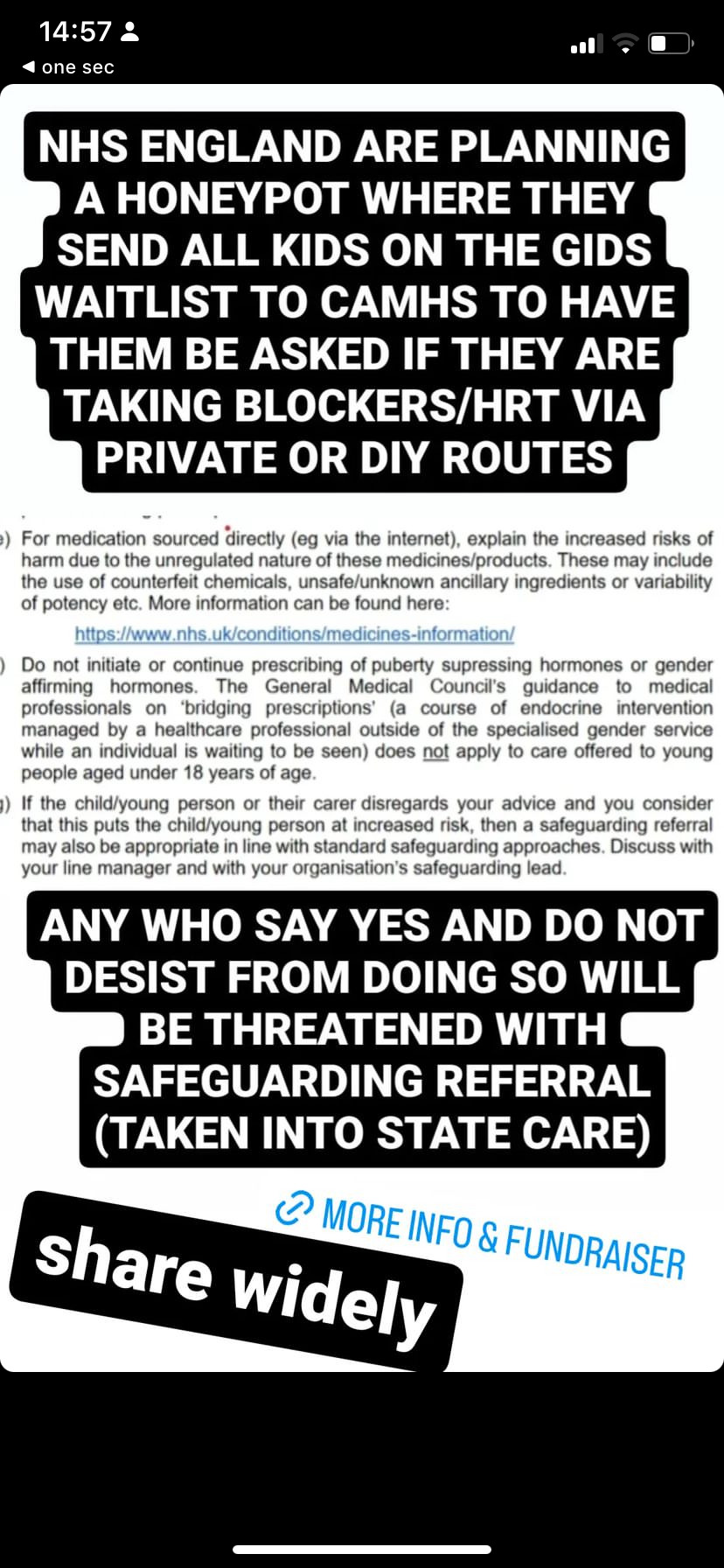
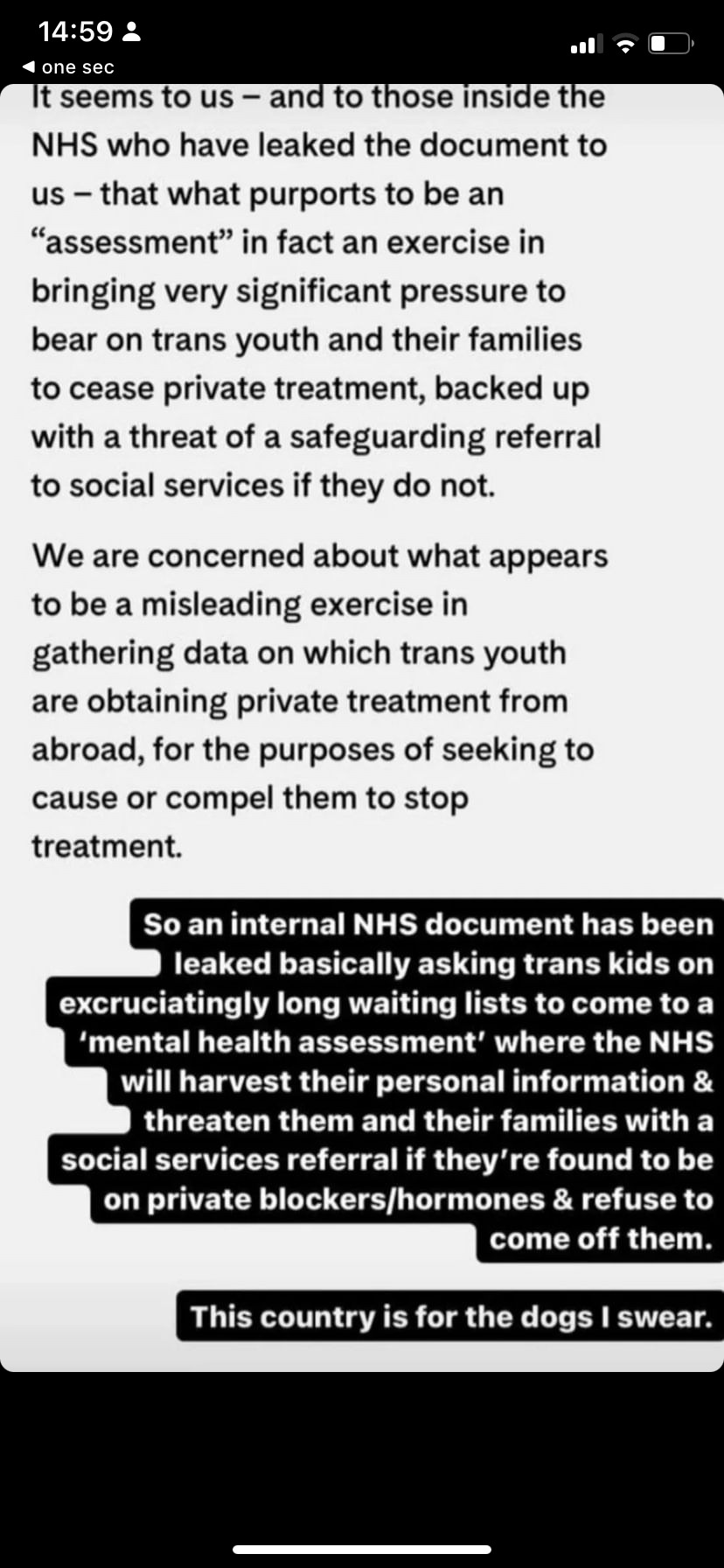
https://goodlawproject.org/crowdfunder/nhs-cyp-guidance/?fbclid=PAZXh0bgNhZW0CMTEAAaadkVMoRUHpcFptnjlifnc1xJ0i7YGVi78tfv2vEXVaVIQDPTEp1-ozNcY_aem_AfqNP9xEERFn6GRCZCIP7B2RriLi8ZN7pVAFzmNwdvqIXW0nmc1mTe5Hq0UV3xC6VPWdYe1x64wHk7O6-HPOhIdf
Please share, tag someone who could bring this to a lot of people, and post to other platforms. Not originally mine, idk who is the source of the screenshots.
Image ID under cut
Image ID:
In thick white text on black background-> NHS ENGLAND ARE PLANNING A HONEYPOT WHERE THEY SEND ALL KIDS ON GIDS WAITLIST TO CAHMS TO HAVE THEM BE ASKED IF THEY ARE TAKING BLOCKERS/HRT VIA PRIVATE OR DIY ROUTES
Text is broken and in the middle is an excerpt from a leaked nhs document-> a) For medication sourced directly (e.g via the internet), explain the increased risks of harm due to the unregulated nature of these medicines/products. These may include the use of counterfeit chemicals, unsafe/unknown ancilliary ingredients or variability of potency etc. More information can be found here (link to nhs website). // b) Do not initiate or continue prescribing puberty surpressing hormones or gender affirming hormones. The General Medical Council's guidance to medical professionals on 'bridging prescriptions (a course of endocrine intervention managed by a healthcare professional outside of the specialised gender service while an individual is waiting to be seen) does not apply to care offered to young people under 18 years of age. // c) If the child/young person or their carer disregards your advice and you consider that this puts the child/young person at increased risk, then a safeguarding referral might also be appropriate in line with standard safeguarding approaches. Discuss with your line manager and your organization's safeguarding team.
Thick white text on black background continues-> ANY WHO SAYS YES AND DO NOT DESIST FROM DOING SO WILL BE THREATENED WITH SAFEGUARDING REFERRAL (TAKEN INTO STATE CARE)
Next image ID:
In black text on white background, from the news article linked above-> It seems to us - and to those inside the NHS who have leaked the document to us - that what purports to be an "assessment" in fact an exercise in bringing very significant pressure to bear on trans youth and their families to cease private treatment, backed up with a threat of a safeguarding referral to social services if they do not. // We are concerned about what appears to be a misleading exercise in gathering data on which trans youth are obtaining private treatment from abroad, for the purposes of seeking to cause or compel them to stop treatment.
In the same thick white text on black background as previous image-> So an internal NHS document has been leaked basically asking trans kids on excruciatingly ling waiting lists to come to a 'mental health assessment' where the NHS will harvest their personal information & threaten their families with a social services referral if they're found to be on private blockers/hormones & refuse to come off them. // This country is for dogs i swear.
#trans pride#transblr#trans safety#trans tips#trans uk#uk trans#uk#england#trans ftm#trans mtf#trans nonbinary#trans man#trans woman#trans male#trans female#trans masc#trans femme#transmasculine#transmasc#trans feminine#transfem#trans enby#enby#nonbinary#gender nonconforming#genderqueer#gender queer#gnc#lesbian#gay
5K notes
·
View notes